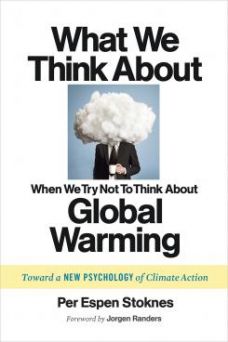What We Think about When We Try Not to Think about Global Warming: Toward a New Psychology of Climate Action

Scholarly and policy circles can take it for granted that climate change is an undeniable reality. But as shown in the recently published What We Think about When We Try Not to Think about Global Warming, there is still a mass of people – including educated, influential ones – who think otherwise. It is estimated that 30–60 per cent of the population of wealthy Western countries identify as climate sceptics (and “the strongest predictor of expressing climate change denial is having a libertarian, free-market worldview”). Another peculiarity is that there was more public concern about climate change in 1989 than there is now. Perversely, as the threat has become more familiar and less novel, it has also come to seem less important.
There are multiple reasons that someone might reject evidence of climate change. One is passive denial: accepting a particular reality would harm a person’s status or thinking. It would also require a change, whether in belief or action, that the person is unwilling to make. In discussing this kind of wilful ignorance, and the politically charged denialism that can accompany it, the psychologist/economist Per Espen Stoknes draws parallels between climate change and other social harms that required major cultural shifts in thinking: slavery, apartheid, the Vietnam War and tobacco use. In each case, it took a long time for a powerful group to acknowledge unpalatable truths and bear social costs.
Instead of focusing on these individual and social levels of change, some prefer to stress the governmental and international levels. In this regard, denial of human-induced warming can be seen in light of geopolitical competition and narrow self-interest, where the desire to maximize one country’s prosperity comes at the expense of global cooperation. Ultimately, of course, such thinking will hurt every nation. But the short term presents different incentives.
Perhaps all this is obvious. However, Stoknes argues that it is crucial to understand the psychology of individual denial, and to work upward from there, because top-down action has not been sufficiently effective so far. As he writes,
“More than twenty years of climate negotiations have resulted in almost no implemented reductions. Most of the larger reductions that have happened since 1990 have come about by other means, such as efficiency gains in energy or the collapse of the Soviet Union with its gigantic, inefficient industries. Global and national leadership is missing. Political scientists, economists, strategists, sociologists, and anthropologists each have their favorite levels to explain why we disagree, and why so little is happening. None of them really address the role of denial.”
From this premise Stoknes offers lessons from several branches of psychology. The short-termism and self-interest mentioned earlier, for instance, are considered efficient when viewed through the lens of evolutionary psychology. And cognitive psychology tells us that it can be difficult for a non-specialist to gain a sense of actionable urgency from the facts and figures of climate science.
These schools of psychology also offer suggestions about how to reduce disinterest or disbelief in climate change. One is very simple: reframing the issue. For instance, it has been determined that Americans perceive “global warming” as more of a threat than “climate change”, even when these terms are used interchangeably. The former term, despite being inexact, gets people to care. There are many other examples: “earmarked offset” vs. “carbon tax”, for instance, or “free-market energy” vs. “solar energy”.
Another insight, this time from social psychology, is that simply sharing more information is unlikely to sway climate agnostics. Indeed, more information can actually lead to more resistance. Instead, targeting emotions (other than shame) is key for some. It can be easier to change our beliefs than our behaviour if the two are misaligned. In this case, it may be more convenient to disbelieve climate science than to acknowledge it and feel pressured to take action – unless effective communicators, with whom we feel a connection, can make us socially and emotionally invested in doing so.
It seems unfortunate that the facts surrounding climate change are insufficient to drive the kind of action that is needed. And the five Ss Stoknes propounds for effective communication strategies may run the risk of oversimplifying or depoliticizing environmental messages:
“1. Social. They use the power of social networks.
2. Supportive. They employ frames that support the message with positive emotions.
3. Simple. They make climate-friendly behaviors easy and convenient.
4. Story-Based. They use the power of stories to create meaning and community.
5. Signals. They use indicators for feedback on societal response.”
However, without mass popular support, governmental efforts to address climate change are likely to fall short. A book like this – with its accessible language, humorous tone, and suitability for a general audience – could help to bridge the gaps in understanding and advocacy.
Further reading:
American Psychological Association (2009), Psychology and Global Climate Change: Addressing a Multi-faceted Phenomenon and Set of Challenges, Task Force on the Interface between Psychology and Global Climate Change, available at http://www.apa.org/science/about/publications/climate-change.aspx.
Jacques, Peter J, Riley E Dunlap and Mark Freeman (2008), “The organisation of denial: Conservative think tanks and environmental scepticism”, Environmental Politics Vol 17, No 3, pages 349–385, available at http://www.tandfonline.com/doi/abs/10.1080/09644010802055576.
Mooney, Chris (2014), “The Strange Relationship between Global Warming Denial and…Speaking English”, Mother Jones, 22 July, available at http://www.motherjones.com/environment/2014/07/climate-denial-us-uk-australia-canada-english.
Sharma, Divya and Sanjay Tomar (2010), “Mainstreaming climate change adaptation in Indian cities”, Environment and Urbanization Vol 22, No 2, pages 451–465, available at http://eau.sagepub.com/content/22/2/451.abstract.
Book note prepared by Christine Ro
Search the Book notes database
Our Book notes database contains details and summaries of all the publications included in Book notes since 1993 - with details on how to obtain/download.
Use the search form above, or visit the Book notes landing page for more options and latest content.
For a searchable database for papers in Environment and Urbanization, go to http://eau.sagepub.com/

